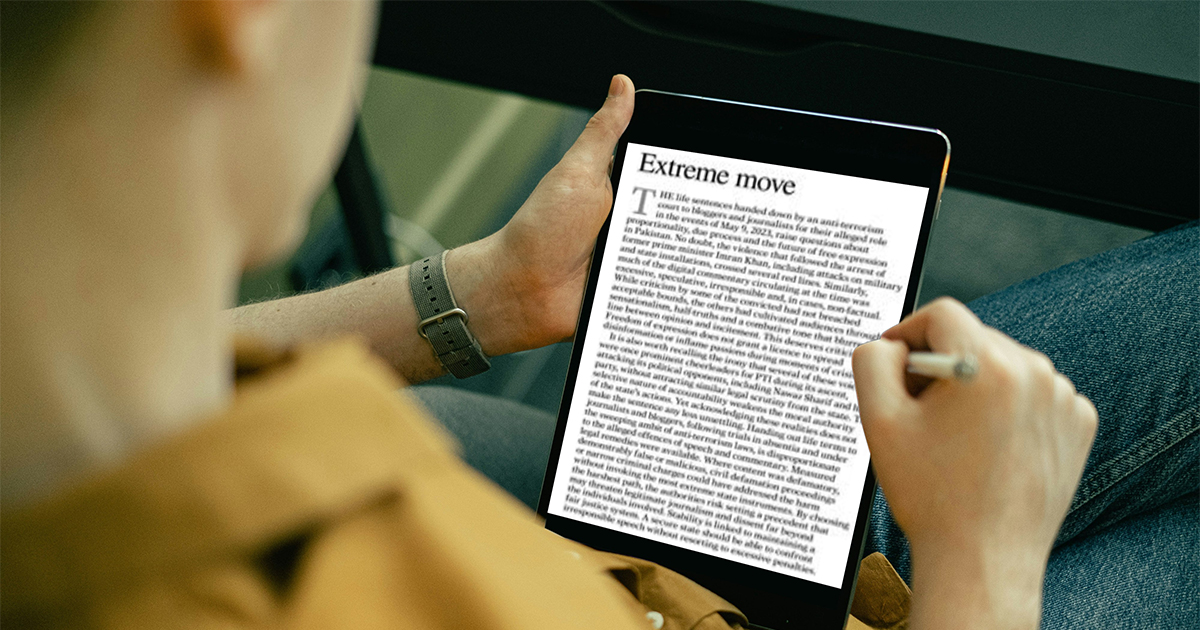Ministry's report says national media transformed with digital interventions
JournalismPakistan.com | Published: 28 August 2021
Join our WhatsApp channel
The Ministry of Information's three-year performance report outlines improvements in Pakistan's media sector through digital interventions. Key initiatives aim to modernize and regulate media practices since 2018.Summary
ISLAMABAD—Revolutionary steps coupled with the introduction of cutting-edge technology paved the way for transforming the national media networks in the country, says a three-year performance report of the Ministry of Information & Broadcasting.
APP reported that the journey of national media transformation kicked off in 2018 when Prime Minister Imran Khan came into power and assigned the Ministry of Information and Broadcasting with the task of digitizing its departments to push the country’s narrative at the international level in an effective way.
Before August 2018, rules, regulations, and systems for the development of the media industry were either outdated or non-existent. Projection of government’s initiatives and projects at home and to create a positive image of the country abroad was incoherent and lacking synergy.
Resultantly, the public sector media organizations became irrelevant and uncompetitive due to the use of obsolete and redundant analog technology. The media industry grew exponentially, but there was no system in place to provide proper media education and training to media persons.
The entire government machinery was using inefficient and non-transparent manual file handling. The media industry was facing a financial crunch and a sense of dissatisfaction and job insecurity by the media workers.
However, the remarkable steps of the government led to a visible improvement in the overall working of the media industry through key objectives of the vision including effective two-way communication by the state with citizens to ensure good governance, strengthening Pakistan’s image abroad, digitalization, and modernization of APPC, PBC, PTVC, SRBC, and PEMRA, streamlining of registration procedures for publications, news agencies, digitization of media monitoring and analysis processes, and automation of registration procedures.
Promotion and development of film industry, media development through capacity building, merit-based financial assistance to journalists/journalist bodies, e-filing system for ministry and attached departments, setting up of state-of-the-art media university to provide quality education in the fields of mass media, social media, and communication and transparent and fair distribution of government advertisements also formed part of key objectives of the present government’s vision.
For the realization of the vision, the ministry took several initiatives including the establishment of the Pakistan Information Commission, Digital Media Wing, and bringing all media regulatory bodies under one umbrella of Pakistan Media Development Authority (PDMA).
It also approved a new advertisement policy and launched an online application for the Press Registrar Office, and Audit Bureau of Circulation (ABC).
During the PTI tenure, Pakistan Broadcasting Corporation (PBC) joined a few nations like Russia, Indonesia, and South Africa by adopting DRM transmission technology and developed a mobile application (Android & iOS), and started live audio streaming by 25 channels.
ToRs were finalized for the newly created board of governors (BoGs) on Film Policy 2018 and a database of artists was being created and updated.
The ministry completed physical verification of over 800 newspapers/periodicals and distribution of Rs42.23 million was done to journalists and press clubs. It has channeled the government’s initiatives, programs, and projects in social media, identified, and reacted to fake news on Pakistan.
Awareness and outreach for the ministry’s initiates included effective two-way communication by the state with citizens to ensure good governance and strengthening Pakistan’s image abroad.
Transparent and fair distribution of government advertisements was being introduced.
On the legislative and policy framework front, the Ministry of Information drafted an advertisement policy for print, electronic, social, and digital media.
The ministry drafted the Protection of Journalists and Media Professionals Act, 2020 jointly with the Ministry of Human Rights, and proposed the followings bills: Pakistan Broadcasting Corporation (PBC) Amendment Bill, Associated Press of Pakistan Corporation (APPC) Amendment Bill, Press Council of Pakistan (PCP) Amendment Bill, Motion Pictures Ordinance Amendment Bill, Pakistan Electronic Media Regulatory Authority (PEMRA) Amendment Bill, Press, Newspapers, News Agencies & Books Registration Amendment Bill and Defamation Amendment Bill.
It prepared Digital Media Advertisement Mechanism, National Digital Cable Policy, 2021 and notified SOPs/criteria for grant of advertisement rates, constituted PTV Board of Directors, 2021, constituted PEMRA Council of Complaints, 2021, notified PBC, APP Rules, and notified Pakistan Information Commission Rules.
The administrative wing of the ministry administered PSDP projects to the tune of Rs2 billion, coordinated four projects in PSDP plus, and with Public-Private Partnership Authority including Media University. Besides hiring of a transactional advisor for two PSDP plus projects was at the final stage. The ministry secured a technical supplementary grant of Rs1.4 billion for media campaigns.—APP
KEY POINTS:
- Digital interventions began in 2018 under Prime Minister Imran Khan.
- Establishment of the Pakistan Media Development Authority to unify media regulatory bodies.
- Initiatives included the launching of online applications and a new advertisement policy.
- The ministry completed verification of over 800 newspapers and distributed financial assistance to media workers.
- A technical supplementary grant of Rs1.4 billion was secured for media campaigns.

























